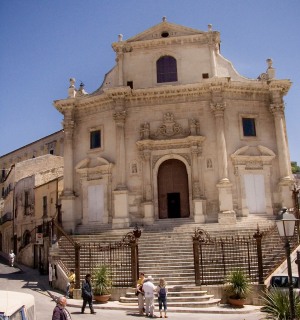Christian-History.org does not receive any personally identifiable information from the search bar below.
Purgatory: Roman Catholic Tradition and Apostolic Sources
Most Protestants don't realize that Purgatory is a Roman Catholic tradition based on a very interesting early church—and possibly apostolic—belief.
 Purgatory Chasm in Sutton, Mass.
Purgatory Chasm in Sutton, Mass.Photo by Dale Martin
Hades Is Thrown into the Lake of Fire
Revelation 20:14 makes the rather shocking statement that Hades is thrown into the lake of fire. Really? Most of us have believed that Hades is the lake of fire.
Obviously, it's not.
Hades, in the New Testament, is the place of the dead. The early Church believed that all dead go there. Most fundamentalist Protestant denominations "officially" agree, though I've found that doctrine is not well-known except perhaps in seminaries.
Actually, fundamentalist Protestants agree that all the dead used to go there. Now, however, Hades has been emptied since Christ rose. Verses like 1 Peter 3:19 and 4:6, which say that Jesus preached to "the spirits in prison" and "the dead," are used to teach this idea.
Ephesians 4:8 adds that when Jesus rose he "led captivity captive," and that passage is also used to suggest he released the righteous dead from Hades.
Ad:
Our books consistently maintain 4-star and better ratings despite the occasional 1- and 2-star ratings from people angry because we have no respect for sacred cows.
 Abraham Ortelius' 1492 map of St. Patrick's Purgatory
Abraham Ortelius' 1492 map of St. Patrick's PurgatoryJesus Describes Hades
In Luke 16, Jesus tells the story of Lazarus the beggar and a rich man. When they die they are both carried to the place of the dead. Jesus specifically says the rich man is in Hades, and he does not say this of Lazarus. He says only that Lazarus was carried to Abraham's bosom.
However, though there is a "great gulf" between Lazarus and the rich man, they can see each other. They are in some manner in the same place.
Interestingly enough, The Book of Enoch (or 1 Enoch) gives a very similar description of the place of the dead. Enoch is cited in the Bible, in Jude 14-15. On the subject of Hades, it reads:
I went to another place, which was still more horrible than the former, and I saw … a great fire there which burned and blazed, and the place had a crevice as far as the abyss, being full of great, descending columns of fire … Then Uriel … one of the holy angels who was with me said … to me, "This place is the prison of angels, and here they will be imprisoned forever.
From there I went to another place with a mountain of hard rock. … Raphael, … one of the holy angels who was with me, said to me, "These hollow places have been created for … the spirits of the souls of the dead, … yea, that all the souls of the children of men should assemble here. These places have been made to receive them until the day of their judgment. (1 Enoch 21-22)
Enoch was very popular with the early church. It's mentioned several times by name, but ideas from Enoch pervade the writings of most early Christian writers. Justin Martyr, for example, says around A.D. 150 that demons are the spirits of dead men.
This is shocking to our modern ears, but he is referring to the giants mentioned in Genesis 6:4. Enoch says that they were cursed by God never to rise bodily, and so their spirits wander the earth looking for other bodies to possess. This is a frequent theme in the early Christian writings. I know I read it recently in the writings of Commodianus, who wrote around A.D. 240.
Hades? I Thought We Were Talking about Purgatory?

Hades is Purgatory. While Protestants generally believe Hades was emptied at the resurrection of Christ, that is not what the early church believed. They read Enoch. Enoch says, "These places have been made to receive them until the day of their judgment." They believed Hades wouldn't be emptied until the day of judgment.
I won't draw conclusions on this one. I highly suspect that the afterlife is far more complicated than our feeble minds can comprehend. However, the Scripture the early church used is pretty direct. Revelation 20:13 says that Hades gives up the dead that are in it at the judgment, at which time it is thrown into the lake of fire.
A Pre-Judgment Judgment?
The Orthodox Churches and Purgatory
The Orthodox Churches, the eastern churches separated from Rome by the great schism of 1054, do not believe in Purgatory. They still hold to the ancient doctrine that Hades will not be emptied until the judgment.
They do, however, believe that part of Hades is burning with fire and that the prayers of the saints can obtain forgiveness for the departed dead. This tradition is also quite ancient, being mentioned as part of the Perpetua and Felicitas story around A.D. 200.
This is where the real source of the tradition of Purgatory is.
Protestants tend to believe that judgment happens basically as soon as you die. If you've accepted Christ, you go to heaven. If you haven't, you go to hell.
If that's true, I wonder, then why does God have to bother to have a judgment in Revelation 20? Why bother emptying a burning Hades just to throw the people in it into a burning lake of fire? Why bother to have a judgment if these people are already judged?
The early churches believed that the judgment was real. No final decision was made until the judgment. Yes, people like the rich man were in flames in Hades, while people like Lazarus the beggar were in comfort; nonetheless no final decision was made.
This left room for things to change. I have put The Suffering of the Holy Martyrs Perpetua and Felicitas on this web site. On that page, Perpetua prays for deliverance for her dead brother Dinocrates.
This is a surprise to us Protestants, but the early church believed there was still hope for the dead who were in Hades awaiting judgment. They did not pray to the dead, as Roman Catholics do today, but they did pray, at least occasionally, for the dead.
Purgatory Just Needs a Little Time
Given the early church understanding of Hades, it's no surprise that over time this evolved into strange religious practices and beliefs.
Purgatory is not much different than the flaming part of Hades; however, the section of comfort, where Abraham is (or was), seems to have disappeared from Roman Catholic thought.
To Roman Catholics, Purgatory is:
… a place or condition of temporal punishment for those who, departing this life in God's grace, are, not entirely free from venial faults, or have not fully paid the satisfaction due to their transgressions. (The Catholic Encyclopedia, newadvent.com)
Purgatory: What's Been Added
As you can see, it is not so much Purgatory that is a late tradition. Purgatory is the flaming part of Hades updated to be a place of "purging." It is the thoughts and practices that surround Purgatory that are new tradition. These include:
- Payment for unremitted sin
- Prayer for those in Hades/Purgatory
- Indulgences
Payment for Unremitted Sin
Origen, the great teacher of the early third century, was a known universalist. He believed that in the end, God would reconcile everyone to himself, even if it didn't happen until after death.
Origen, who was from Alexandria originally, was taught and influenced by Clement of Alexandria. Both their writings were popular and influential after their time, and the church in Alexandria was noted for its learning. It had a catechetical school that trained such great third-century bishops as Gregory Thaumaturgus and Dyonysius.
Mystical and speculative thinking were typical of the writings of Clement and Origen, and between their writings and the catechetical school that both men headed at one time, Origen's ideas spread.
This included his ideas on reconciliation after death. Though these were unique to his time (though they may have been shared by his teacher, Clement), they were picked up by such greats as the fourth-century Cappadocian Fathers: Basil the Great, Gregory of Nyssa, and Gregory of Nazianzus. They were highly influential leaders and teachers.
Gregory of Nyssa, for example, wrote:
There is a necessity that the defilements which sin has engendered in the soul ... should be removed from it by some remedial process. The medicine which virtue supplies has, in the life that now is, been applied to the healing of such mutilations as these. If, however, the soul remains unhealed, the remedy is dispensed in the life that follows this. (Catechetical Oration, ch. 8)
Once the idea that suffering in Hades could remediate sin after death set in, the entire foundation for Purgatory had already been laid.
1. Prayer for those in Hades
The Catholic Encyclopedia, in its article on Purgatory, argues that the fathers spoke often of prayer for the dead. I don't agree.
It is true that Perpetua prays for her dead brother in The Suffering of the Holy Martyrs Perpetua and Felicitas. She had a vision of Dinocrates in a place of suffering. She poured out her heart in prayer, and she felt that he was in a better place.
However, this is clearly not normal. She says that his name had never even entered her mind for some length of time. Obviously, she did not make it a regular practice to pray for him. She simply did so in response to a vision.
Further, Dinocrates was not a departed saint. He died at seven years of age. This was a child.
In De Corona, Tertullian does say that offerings are made for departed saints every year on the day of their departure. He specifically says these are "for birthday honors." There is nothing in this offering having to do with deliverance from suffering.
In On Monogamy he mentions a wife praying for her departed husband and, again, "offering" for him once per year. Again, a specific reason is given. She is requesting "refreshment" for him as he awaits the judgment. This does not necessarily, or even probably, suggest deliverance from afterlife punishment.
After several other quotes, which do mention afterlife punishment but do not mention prayers for deliverance from it, the Catholic Encyclopedia asserts, "The apostolic practice of praying for the dead, which passed into the liturgy of the Church … " There is simply no evidence that the practice is actually apostolic.
In the pre-Nicene fathers, the evidence is scanty concerning prayer for the dead for any reason, and there is no evidence at all that any prayers were ever offered on behalf of the dead in expectation that it would ease their suffering. The lone exception is the vision of Perpetua, about a child and not a saint.
So the first thing that's been added is regular prayer for those suffering in Purgatory.
The ultimate addition, however, has to be …
Indulgences
I will say only a little about these her, as I have a whole page on indulgences. It is simply shocking that the Roman Catholic Church (RCC) has not retired this practice in embarrassment.
Ultimately, indulgences have been a fundraiser for the RCC. It was a lot more successful when the RCC ruled Europe and kept people in ignorance and superstition. It is much easier to trick the ignorant and superstitious out of their money than it is to extort the educated.
Catholic Encyclopedia
The Catholic Encyclopedia is online at newadvent.com. I am using it for much that is written on this page in order to answer things as they are presented by the Roman Catholics.
I do not want to be found putting words in anyone's mouths that don't belong there. I believe that I am quoting them fairly and considering context in my quotes. I will always do that, no matter which group I am addressing.
Indulgences are a release from the "temporal punishment" for sin. Roman Catholics do not believe that indulgences will deliver from eternal punishment, just from the temporary punishments given in Purgatory, or even in this life.
Really, the whole idea is far-fetched, a term I use to be kind. I could use far worse terms and feel quite justified.
You have got to hear these claims on the Catholic Encyclopedia's Indulgence page!
To say that an indulgence of so many days or years is granted means that it cancels an amount of purgatorial punishment equivalent to that which would have been remitted, in the sight of God, by the performance of so many days or years of the ancient canonical penance.
While the article adds that "the reckoning makes no claim to absolute exactness," it simply astonishes me that anyone could say something like this. They made thorough reference to early Christian writers in justifying the existence of Purgatory, but not a single reference to this idea of indulgence.
That is because you will never find a Pre-Nicene father even thinking this way. Here's further claims made by the Catholic Encyclopedia. My apologies for dragging this on, but I am simply astounded by these claims and that anyone can expect others to believe these things.
- "Each good action of the just man possesses a double value: that of merit and that of satisfaction, or expiation. Merit is personal, and therefore it cannot be transferred; but satisfaction can be applied to others."
- "The satisfaction of Christ is infinite, it constitutes an inexhaustible fund which is more than sufficient to cover the indebtedness contracted by sin, Besides, there are the satisfactory works of the Blessed Virgin Mary undiminished by any penalty due to sin." [Webmaster note: If Christ's satisfaction is infinite, then why do we need the merits of Mary or any other saint?]
- "Once it is admitted that Christ left the Church the power to forgive sins, the power of granting indulgences is logically inferred." [It is???]
The Catholic Encyclopedia actually quotes Paul's statement, "[I] now rejoice in my sufferings for you, and fill up those things that are wanting of the sufferings of Christ, in my flesh, for his body, which is the church," (Col. 1:24) as though Paul somehow meant that he was obtaining forgiveness for sins of others, rather than suffering through the work of preaching and traveling in order to help the Colossians.
I'm speechless. I thought that Hebrews says that Christ is not like earthly priests who have to offer for sins repeatedly, but that he instead appeared once to put away sin by the sacrifice of himself.
What is worst of all is that these indulgences were usually purchased with money in the past. It was a common way to raise funds in the Middle Ages, and it was such a detestable practice that it served as the strongest impetus for the Reformation. Luther's 95 theses exclusively concerned the sale of indulgences.
Conclusion
The Roman Catholic teaching of Purgatory is the product of the early church belief that Hades was not emptied at the resurrection but is waiting to be emptied at the judgment. It demystifies some of the more shocking and puzzling passages in the very early writings of the Church (such as Perpetua's heartfelt prayers for her departed brother).
While we can grant them a possible apostolic source for Purgatory, we cannot grant them that for the practices they have developed to deliver from Purgatory. Worst of all is indulgences, one of the strangest beliefs that has managed to survive into the modern era.
Early Church History Newsletter
You will be notified of new articles, and I send teachings based on the pre-Nicene fathers intermittently.
When you sign up for my newsletter, your email address will not be shared. We will only use it to send you the newsletter.